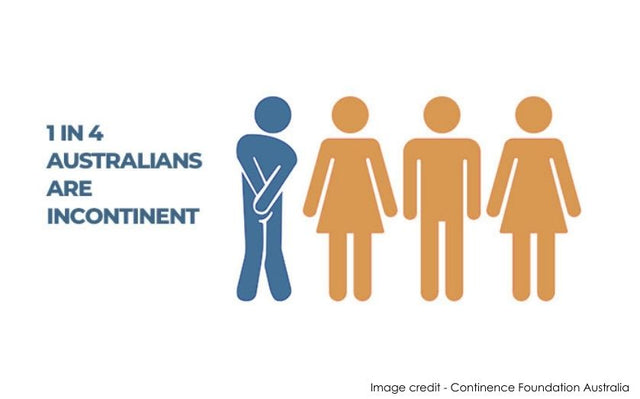Male incontinence. It’s not your typical over-a-beer topic after a swim or a game of golf; but estimates suggest it does affect around 10% of Aussie men, with a worrying 70% of sufferers (women and men) delaying seeking help. This has to stop.
But let’s get the facts straight first. Incontinence isn’t a one-type-fits-all issue. Together with Dr Chris Love we're answering some of your questions to get a better understanding.
What are the different types of male incontinence?
Urge incontinence
Described as a sudden, strong need to pee (which means you might not always make it), the most common cause of urge incontinence in men is prostate disease. Less common in younger men, around 30% of men between 70 and 84 experience urge incontinence, rising to 50% for those over 85.
Stress incontinence
Stress incontinence is caused by outside pressure – such as coughing, laughing or lifting something heavy – putting pressure on a weak bladder, causing it to leak urine.
Urinary Frequency
As the name suggests, this type of incontinence refers to needing to empty your bladder much more frequently than usual.
Overflow incontinence
Overflow incontinence occurs when there’s an obstruction, such as an enlarged prostate, which stops your bladder from fully emptying. This causes the bladder to over-fill, and excess urine to leak.
Overactive Bladder
An overactive bladder often refers to a combination of incontinence types, such as urge and urinary frequency, sometimes it leads to urinary leakage, but sometimes it may just be the powerful urge to go – often – which is still stressful and has an impact on your ability to enjoy everyday activities.
Does incontinence only affect older men?
“Incontinence isn’t only an issue for older men, but it’s definitely more common with age. Prostate cancer surgery is the most common cause of urinary leakage in younger men,” explained Dr Love.
What causes male incontinence?
The most common causes of urinary incontinence are problems with the tube which exits the bladder – the urethra – such as narrowing, nerve damage, nervous system disorders such as Parkinsons’ disease, stroke, spinal cord injury, urinary tract or prostate infection, diabetes, certain medications, or prostate surgery.
“Being overweight or having a chronic cough can contribute to men developing incontinence; or can worsen it in those who are already affected,” said Dr Love.
Prostate disease – and prostate disease treatments – are the most common causes of male urinary incontinence. These include prostatitis (an infection of the prostate gland), benign prostatic hyperplasia (an enlarged prostate which is not cancerous and sometimes requires surgery), and prostate cancer.
Prostatitis is more common in younger men, benign prostatic hyperplasia is most common in middle aged men, while prostate cancer is most common in older men – but can affect men of any age.
Prostate cancer itself may not cause urinary incontinence, but cancer treatment to cure or manage it often does. The incontinence resulting from cancer treatment may be temporary, or it can be ongoing – and the severity is different for everyone.
Is any incontinence normal? When should you see a doctor?
“No incontinence is ‘normal’, but a minor dribble – like a few drops after urination – is common,” said Dr Love. “If you notice a sudden onset of incontinence, increased urinary frequency or urgency or waking up a lot overnight to pass urine – it’s important to see a doctor.”
“Unfortunately, many men don’t seek help for incontinence, and we see patients becoming depressed, losing their self-esteem and withdrawing from their usual activities as a result of their condition. Education is the answer,” said Dr Love.
Does incontinence affect your sex life?
“Incontinence can affect many areas of your life, including intimacy, and both incontinence and impotence can occur after prostate surgery.”
How do you manage incontinence?
Incontinence can be a distressing condition which has a huge impact on your social confidence, mental health and ability to lead a productive, active daily life – but it can be managed, whether you need to live with it for a couple of months, or a couple of decades.
“For stress incontinence, surgical treatments may be appropriate, such as slings for mild-to-moderate conditions, or an artificial urinary sphincter for moderate-to-severe incontinence. These are options to discuss with your doctor.”
Modibodi for men uses scientifically-proven absorbent technology to absorb liquid and lock it away in a lining designed to fight bacteria and odour and keep you – and your manhood- dry, comfy and fresh.
Designed to look, and feel, just like your regular briefs or trunks, Modibodi will help boost your confidence, your comfort and your ability to get back to living your normal life – without embarrassing leaks, damp patches or distress.


Header image credit: Continence Foundation Australia








